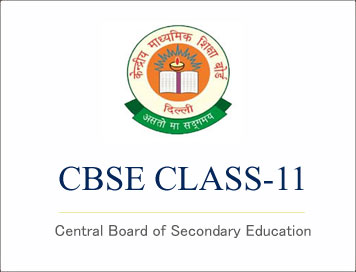CBSE Class-11 Syllabus 2019-20 (Accountancy)
Disclaimer: This website is NOT associated with CBSE, for official website of CBSE visit - www.cbse.gov.in
CBSE Class-11 Syllabus 2019-20 (Accountancy)
Rationale :
The course in accountancy is introduced at plus two stage of senior second of school education, as the formal commerce education is provided after ten years of schooling. With the fast changing economic scenario, accounting as a source of financial information has carved out a place for itself at the senior secondary stage. Its syllabus content provide students a firm foundation in basic accounting concepts and methodology and also acquaint them with the changes taking place in the preparation and presentation of financial statements in accordance to the applicable accounting standards and the Companies Act 2013. The course in accounting put emphasis on developing basic understanding about accounting as an information system. The emphasis in class Xi is placed on basic concepts and process of accounting leading to the preparation of accounts for a sole proprietorship firm. The students are also familiarized with basic calculations of Goods and Services Tax (GST) in recording the business transactions.
The increased role of ICT in all walks of life cannot be overemphasized and is becoming an integral part of business operations. The learners of accounting are introduced to Computerized Accounting System at class
XI and XII. Computerized Accounting System is a compulsory component which is to be studied by all students of commerce in class XI; whereas in class XII it is offered as an optional subject to Company Accounts and Analysis of Financial Statements. This course is developed to impart skills for designing need based accounting database for maintaining book of accounts. The complete course of Accountancy at the senior secondary stage introduces the learners to the world of business and emphasize on strengthening the fundamentals of the subject.
Objectives:
- To familiarize students with new and emerging areas in the preparation and presentation of financial statements.
- To acquaint students with basic accounting concepts and accounting standards.
- To develop the skills of designing need based accounting database.
- To appreciate the role of ICT in business operations.
- To develop an understanding about recording of business transactions and preparation of financial statements.
- To enable students with accounting for Not-for-Profit organizations, accounting for Partnership Firms and company accounts.
Cource Structure :
|
Units |
|
Periods |
Marks |
|
Part A: Financial Accounting-1 |
|
|
|
|
|
Unit-1: Theoretical Framework |
25 |
15 |
|
|
Unit-2: Accounting Process |
105 |
40 |
|
|
|
130 |
55 |
|
Part B: Financial Accounting-II |
|
|
|
|
|
Unit-3: Financial Statements of Sole Proprietorship from Complete and Incomplete Records |
60 |
25 |
|
|
Unit-4: Computers in Accounting |
20 |
10 |
|
|
|
80 |
35 |
|
Part C: Project Work |
30 |
10 |
|
PART A: FINANCIAL ACCOUNTING - I
Unit-1: Theoretical Frame Work
|
Units/Topics |
Learning Outcomes |
|
Introduction to Accounting 11 Periods
Theory Base of Accounting 14 Periods
|
After going through this Unit, the students will be able to:
|
Click Here To Download Full Syllabus
Courtesy: CBSE
